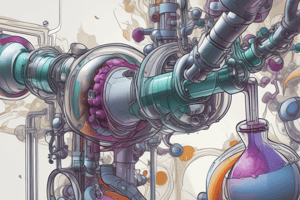Podcast
Questions and Answers
How does the compound transfer during solvent extraction?
How does the compound transfer during solvent extraction?
The compound transfers from one solvent to another due to the difference in solubility or distribution coefficient between the two immiscible solvents.
What is solvent extraction?
What is solvent extraction?
Solvent extraction is the process in which a compound transfers from one solvent to another owing to the difference in solubility or distribution coefficient between these two immiscible solvents.
What advantages does solvent extraction have over distillation?
What advantages does solvent extraction have over distillation?
Solvent extraction has advantages such as low energy consumption, large production capacity, fast action, easy continuous operation, and ease of automation.
What are immiscible liquids?
What are immiscible liquids?
How does solvent extraction compare to chemical precipitation and ion exchange methods?
How does solvent extraction compare to chemical precipitation and ion exchange methods?
Flashcards are hidden until you start studying
Study Notes
Solvent Extraction Overview
- Solvent extraction is a technique used to separate compounds based on their solubility in two different immiscible liquids, usually water and an organic solvent.
- The process involves transferring a solute from one solvent to another, exploiting differences in solubility to isolate desired compounds.
Compound Transfer Process
- During solvent extraction, the target compound partitions between the two phases (immiscible liquids) according to its affinity for each solvent.
- The efficiency of transfer can be influenced by temperature, pH, and the concentration of the compound in the original solvent.
Advantages of Solvent Extraction
- Generally more efficient than distillation for separating compounds with close boiling points.
- Capable of separating heat-sensitive compounds without decomposition, unlike distillation which requires elevated temperatures.
- Offers selectivity for specific compounds, increasing yield and purity compared to distillation methods.
Immiscible Liquids Defined
- Immiscible liquids are substances that do not mix to form a homogeneous solution, typically resulting in distinct layers.
- Common examples include oil and water, where both liquids remain separate, allowing for effective solvent extraction.
Comparison with Other Separation Methods
- Solvent extraction differs from chemical precipitation by relying on solubility rather than changing the chemical state of a solute.
- Vertical differences from ion exchange methods include the mechanism: ion exchange involves electrostatic interactions to swap ions rather than partitioning based on solubility.
- Solvent extraction can be quicker and more economical for certain applications compared to precipitation and ion exchange methods.
Studying That Suits You
Use AI to generate personalized quizzes and flashcards to suit your learning preferences.




